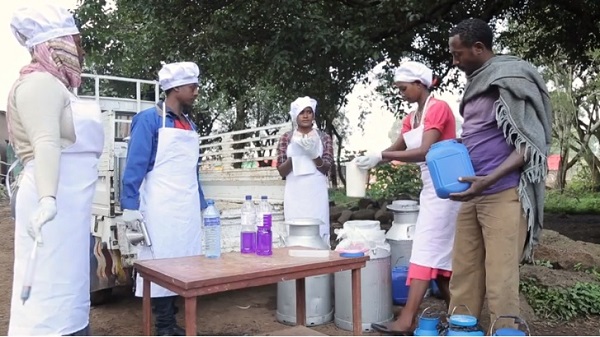
A market-driven partnership to develop a nutritious yogurt in Ethiopia creates local growth while supporting children and women in the fight against malnutrition.
(Danish MFA)–Ethiopia is Africa’s second most populous country and has more than 12 million dairy cows, but only a small share of the inhabitants receive nourishment from milk. Nearly 40% of all Ethiopian children suffer from chronic malnutrition.
This challenge has sparked a collaboration between Danish organizations and businesses and Ethiopian dairies and dairy farmers to develop an affordable yogurt with extra vitamins and minerals missing in the diet of most Ethiopians. The innovative partnership is helping to develop Ethiopia’s dairy sector and establish a sustainable business model for Ethiopian dairies producing the yogurt. The collaboration also increases and secures the income of the Ethiopian dairy farmers selling their milk to these dairies.
The three-year partnership, supported by the Ministry of Foreign Affairs of Denmark/Danida, is a collaboration between DanChurchAid, Global Alliance for Improved Nutrition (GAIN), Arla Food Ingredients, The Confederation of Danish Industry, and two Ethiopian dairies owned by female entrepreneurs. The dairies produce the nutritious yogurt, which is planned to reach the Ethiopian outlets in 2019.
Knowledge sharing ensures a sustainable yogurt product
“This yogurt can improve nutrition in Ethiopia because it is rich on vitamins and minerals. By improving nutrition for Ethiopia’s children, we give younger generations a better future,” says Loni Dairy owner Ms. Tseday Asrat during a visit to Arla Food Ingredients in Denmark.
Loni Dairy and Arla Foods Ingredients have already completed the joint development of a prototype of the yogurt.
“This partnership is a way to double our business, because quality is so important to our dairy. Partnership is about exchanging knowledge and helping each other also beyond just doing business,” says Ms. Tseday Asrat.
Milk offers the greatest hope
“I have one great hope, and that is milk. We do not have any other source of income,” says 26-year-old Ms. Shibire Mamo from the central Ethiopian village of Warereso Malima. She is one of 400 farmers who will be supplying milk for production of the nutritious yogurt by Loni Dairy.
Ms. Shibire Mamo currently owns six dairy cows but she and her husband, 30-year-old Habtamu Tagla, dream of expanding their herd to 20 cows in five years, and they hope to prosper from the increased demand for milk going into the new yogurt.
The couple has received training in improved hygiene and dairy production techniques, enabling them to reduce waste and increase the production and quality of milk, thereby increasing their income.
“When hygiene is improved and the milk is approved according to technical standards, it’s easier for us to introduce quality based pricing for the milk. We will spend this money to give our two children a better education than the one we received, and that would bring me great joy,” says Habtamu Tagla.
About the partnership project
The Ministry of Foreign Affairs of Denmark/Danida, DanChurchAid, Global Alliance for Improved Nutrition (GAIN), Arla Foods Ingredients, The Confederation of Danish Industry, Loni Dairy and other local organisations cooperate from 2017 to 2020 to stimulate local economic growth in the Ethiopian dairy sector and to reduce malnutrition by developing a nutritious yogurt. From 2020, the yogurt will be produced by local Ethiopian businesses according to market conditions.
Results of the cooperation:
- In 2018, 400 dairy farmers from the villages of Wererso Malima and Chancho Buba received training in hygiene and dairy production techniques, enabling them to produce more and better milk. 72 dairy farmers have received training in ensuring better nutrition. The goal is to boost 100 dairy farmers’ sales by 25% in 2020.
- By 2020, the goal is to sell 10,000 units of nutritional yogurt a day, and that 75% of this yogurt will be consumed by children under the age of 7, young girls, and women.
Source: Ministry of Foreign Affairs of Denmark
